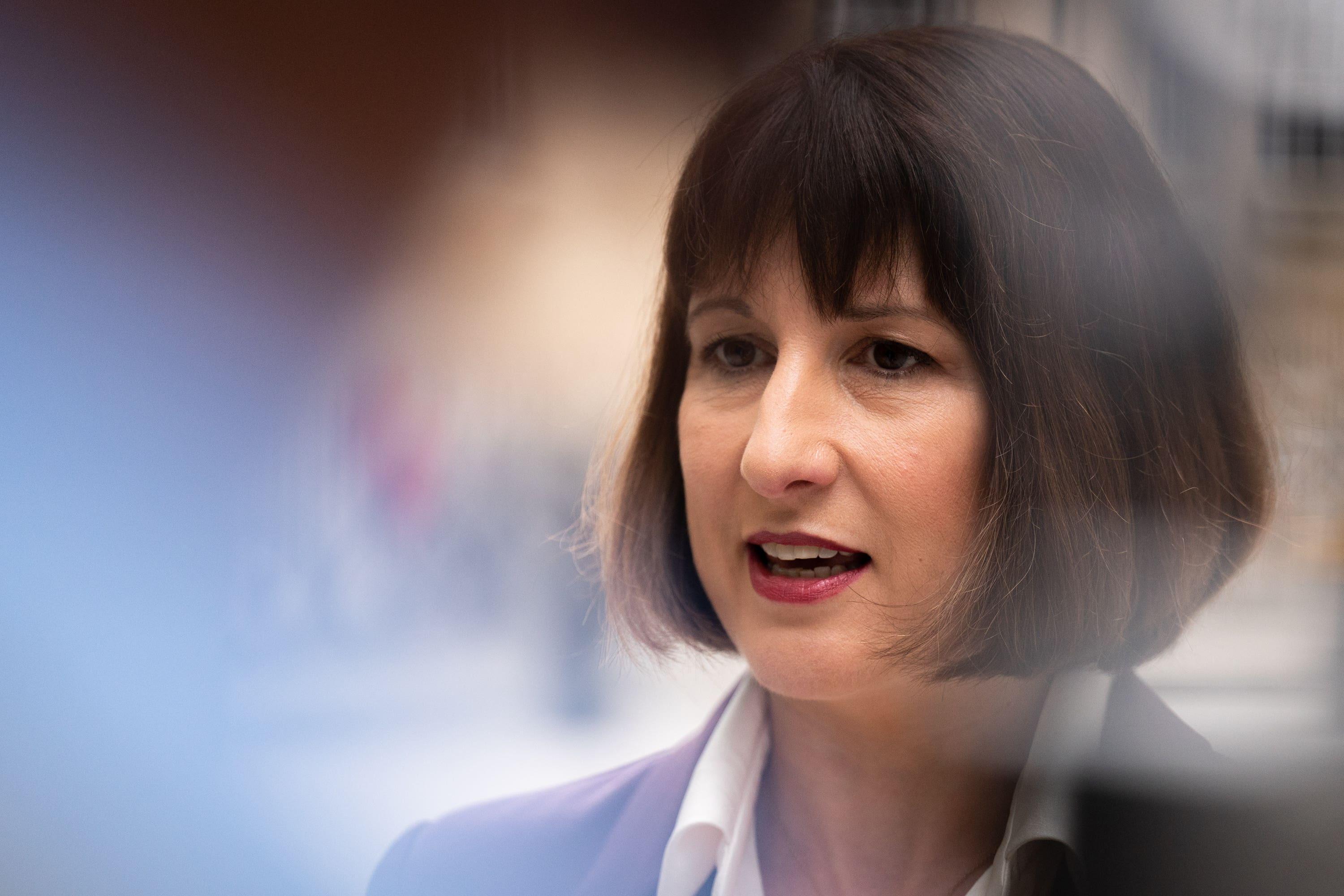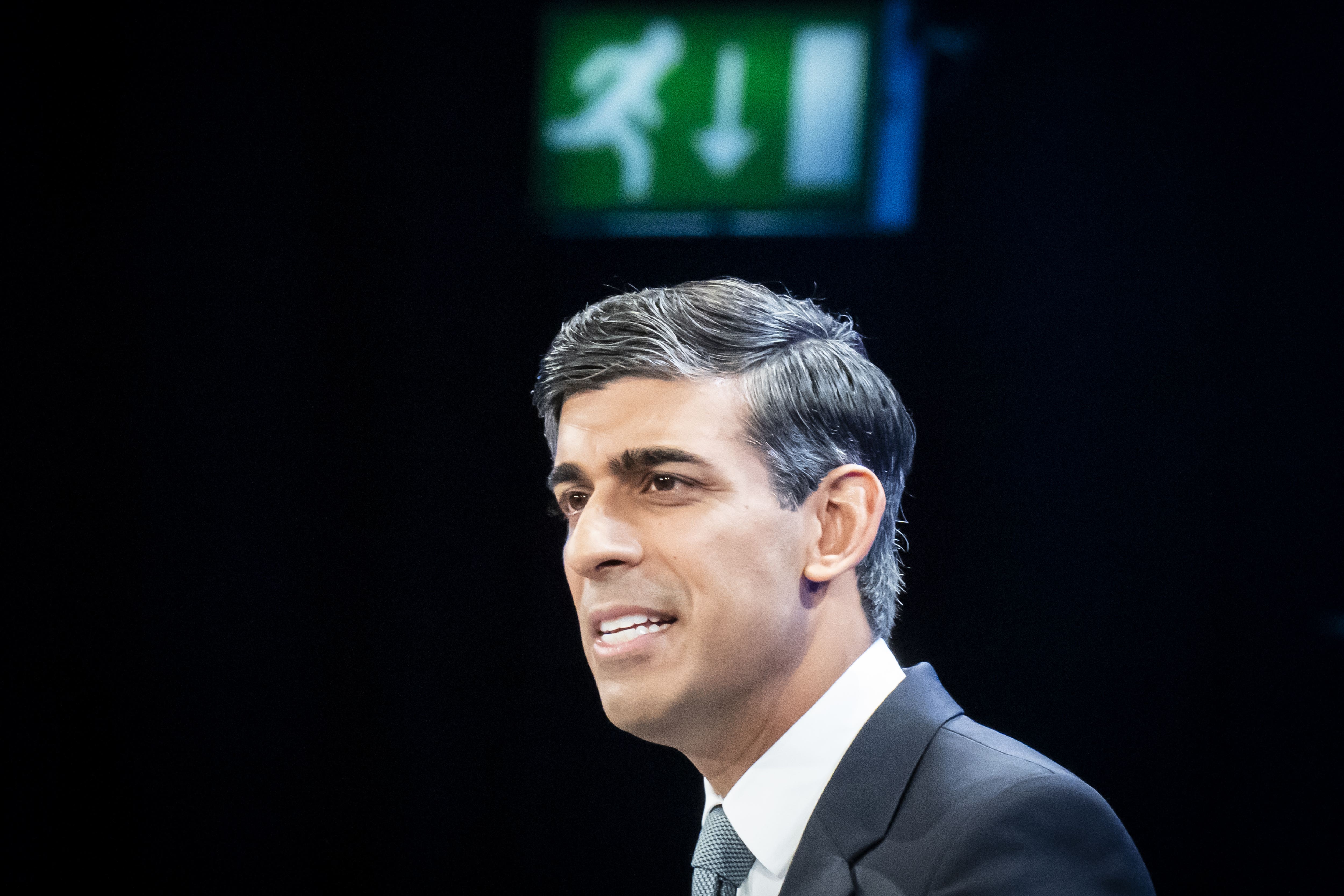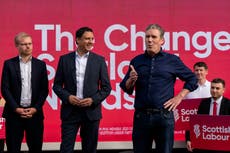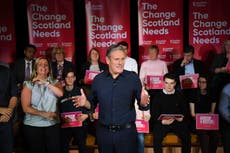Starmer must use the Labour conference to define himself in voters’ eyes... before the Tories get in first
Boosted by a thumping by-election victory in Scotland, Keir Starmer heads to Labour’s annual conference this Sunday on a high. But now the test begins, writes Andrew Grice, with the leader and his party under greater scrutiny than ever


On the face of it, Keir Starmer has a much easier task at the Labour Party conference in Liverpool, which starts on Sunday, than Rishi Sunak had at the Conservatives’ gathering in Manchester.
Labour is 17 points ahead in the opinion polls, and seems on course for a general election victory next year. But the problems of success make it a vitally important party conference, and a big challenge for the party’s leader.
Success brings much greater scrutiny – from voters, the media and business. The party will need to defend its leader and its policies. Some Labour insiders felt that it didn’t respond well recently when the spotlight was thrown onto its long-standing plan to impose VAT on private schools.
There will be plenty more such tests to come.
Despite the party’s consistent poll lead, a nagging doubt plagues Labour’s sharpest minds: they have been confident of winning before – such as in 1992 and 2015 – and yet lost those elections.
They know the country wants change, but also that it has not yet made its mind up that Starmer and his party are that change. Many people are sceptical that any political party can make a difference, which could dilute the usual “pendulum effect” in which voters swing from one side to the other.
‘If not them, why us?’
The Labour leader is under pressure from some natural allies to be bolder on policy in order to give voters a sense of hope. Some of those in the campaign that delivered Tony Blair’s 1997 landslide, including Alastair Campbell, believe that Starmer should be less cautious, insisting that Blair was bolder before his famous victory than Starmer is today. But others claim that this rewrites history, because Blair was ultra-cautious, and dismiss what they describe as the “bold but stupid” tendency pressing Starmer to go much further on policy.
Peter Mandelson, a close Blair and now Starmer ally, is not in the “be bold” camp, but told me: “Keir’s five missions are very big and ambitious, and no one should underestimate the hard, rigorous work in the next year required to construct them.”
The Labour peer thinks there is plenty of time to get this process right, and no need to rush it.
Starmer has written the brief for the conference: “If not them, why us?” The event provides the platform to answer it, and Starmer knows he must grab his chance to get the nation’s attention at what could be his party’s last annual conference before the election. (Labour is planning for a contest next May, in case Sunak presses the button for then, though senior Tories expect him to opt for next October or November.)
One Starmer ally said the goal at the conference is to “make an offer to working people that is hopeful and credible, that they embrace, and can feel confident we can deliver”. Labour’s key target audience will be the first-time Tory voters in 2019, many of them in the red wall in the North and the Midlands.

What can Labour promise voters?
So far, Starmer has prioritised credibility, especially on the economy, to address voters’ doubts about his party’s economic competence. But some allies acknowledge that he now needs to tilt the balance a little towards hope.
The economy will be centre-stage. “The conference will be about three things – growth, growth, growth,” quipped one Labour insider. Health, education, crime and the environment will also feature, and we are promised a “healthy dose of greenery” – a sign that Starmer will not be scared away from the environmental agenda by Sunak’s decision to dilute some net-zero measures and brand Labour’s green investment programme, which amounts to £28bn a year by the end of a five-year parliament, “inflationary”.
Rachel Reeves, the shadow chancellor, will reiterate the party’s commitment to her “iron-clad fiscal rules” – a tactic that is likely to rule out big new spending commitments at the conference. In government, she might find some room for higher spending by closing tax loopholes. Some on Labour’s soft left hope she would allow more flexibility on “borrowing for investment” projects, to ensure that the UK does not fall behind in the global race.
The Labour-affiliated Fabian Society wants borrowing that creates public assets to be treated differently from borrowing that does not, which would boost investment in infrastructure and social housing.
The Fabians have issued a blueprint to turn the five missions – on economic growth, clean energy, health, safety and opportunity – into a 10-year programme for the government to deliver “good growth” and “good society”.
A new pamphlet, Plans for Power, includes some candid advice from a friend that Labour must avoid “collapsing all the differences” with the Tories. Andrew Harrop, the society’s general secretary, said: “Politicians cannot overpromise where the economic and fiscal constraints are real. But nor should they underpromise out of an abundance of political caution. Progress on some goals will depend on significant increases in public spending. Here, immediate achievements may be limited, because a new administration will face unavoidable economic and political constraints. Progress will depend on the economy growing fast enough to generate the necessary new revenues. It may also require politicians to make the political case for extra taxes.”
Labour’s conference slogan, “Let’s give Britain its future back”, has raised some eyebrows, but Team Starmer thinks it will allow him to make the argument that “the Tories have thrown the future away and we will get it back”, as one member put it.
Tory strategists think Sunak’s decision to present himself as the changemaker puts pressure on Starmer to spell out his position on a range of policy issues because he needs to convince voters that he is the “change candidate”. They believe Labour’s fiscal caution makes it look as if Starmer stands for nothing, and link this to his U-turns on policy, notably in junking several pledges he made when he won the party’s leadership contest. This is potentially a powerful Tory attack line: if Starmer is a flip-flopper who can say one thing before a leadership election and do another afterwards, the same could apply at a general election.
Some senior Tories have convinced themselves that they can win a presidential contest against Starmer (or perhaps at least limit the scale of their defeat). Yet they need to refine their strategy. Is the cautious Starmer part of the “status quo” and a 30-year consensus, so that Sunak can be the radical offering change, or is the Labour leader a dangerous “lefty lawyer” who wanted Jeremy Corbyn to become PM? The Tories seem to be saying both, as they did about Blair as opposition leader. First he was Bambi, then “new Labour, new danger” with demon eyes.
Naturally, senior Labour figures are dismissive of Sunak’s reset. “He couldn’t defend the Tories’ record in the last 13 years. He did the only thing he could do, but it will not make any difference,” one told me. “It’s obvious Sunak can’t be the change candidate. The only change the Tories can offer is Suella Braverman, Liz Truss and Nigel Farage, and they are heading in that direction.”

Navigating the political minefield
The prime minister laid several traps for Labour, but Tories who think Starmer will walk into them will probably be disappointed. The draft election programme proposed to the conference by the party’s national policy forum says Labour will “keep the promises made to the North and Midlands and deliver Northern Powerhouse Rail and High Speed 2 in full”. Now that Sunak has broken those promises, it gives Labour cover to follow suit.
I understand that the Labour leadership previously considered ditching HS2, but the party’s powerful northern lobby wouldn’t wear it. Now the argument has moved on. Labour’s fiscal rules would not allow it to do both HS2 and the £36bn of rail, road and bus schemes Sunak has promised instead. Although Starmer will come under internal pressure to reinstate the full HS2 programme, he said his party would “obviously continue” with projects the government has announced. Far from ensnaring Labour, Sunak might have let it off the HS2 hook.
Labour has realised that one way to side-step Sunak’s traps is to agree with him, denying him the satisfaction of creating a dividing line. The Labour front bench will support his plan to raise the legal age for smoking by one year every year. It is open to his proposals to reform A-levels. Labour will not oppose his decision to water down plans to phase out gas boilers by 2035. For now, Labour would restore the 2030 cut-off for the sale of new petrol and diesel cars, but that could change nearer the election. “We cannot provide ammunition for the Tory claim we are anti-motorist,” one shadow minister said.
The Tories are convinced that Labour is weak on immigration, and Starmer needs to provide more reassurance here. On welfare, Labour might toughen its language, and support rather than oppose government plans to reduce the benefits of jobless people who do not make enough effort to find work.
Sunak has joined the culture-war battle on gender. But Labour will try to resist being drawn in, and Starmer has shifted his party’s position to insulate himself against Tory claims that he does not know what a woman is.
Starmer is likely to look better in control of his party than Sunak did in Manchester. There will be a few traditional rows. Left-wingers will complain about a proposed rule change to limit the scope for “contemporary motions” at the annual conference on policies already decided. Momentum, the left-wing group, called it “yet another attack on the rights of Labour members from a Starmer leadership which is patently hostile to party democracy”.
Trade unions, led by the Fire Brigades Union, have tabled motions to the conference opposing any move by Starmer to dilute Labour’s package to enhance workplace rights. But for the most part, Labour should look like a party that is hungry for power, buoyed up by its stunning victory in Thursday’s Rutherglen and Hamilton West by-election. That cannot be said about the Tories, after a conference in which some potential future leaders appeared to be preparing for opposition and a battle for the ideological soul of the party.
Under Starmer, Labour’s direction is set, even if we still await some of his “retail offers”. Labour’s gathering will be all about the leader. Indeed, the Tories have put Starmer centre-stage by making next year’s election about his character. With Sunak’s advisers describing Starmer as a “liability”, he must prove he is an asset to his party.
The Labour conference offers Starmer the opportunity to define himself in the voters’ eyes. He needs to take it before the Tories do the job for him.
Join our commenting forum
Join thought-provoking conversations, follow other Independent readers and see their replies
Comments


Bookmark popover
Removed from bookmarks